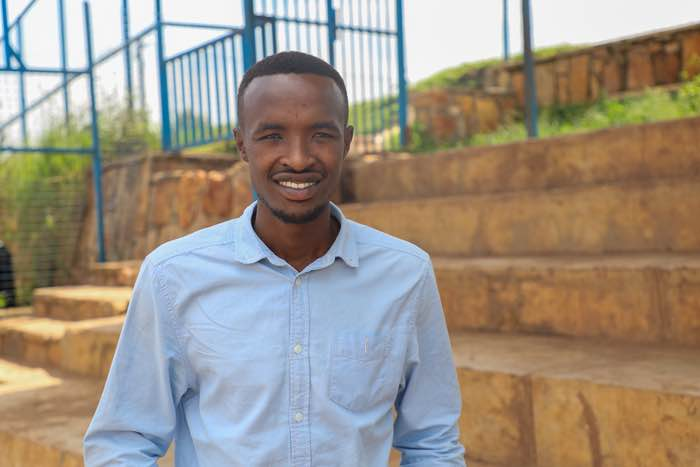
By Eric Didier Karinganire
Innocent Byiringiro has been assisting his family in running their small shop since last year after completing secondary education. However, his aspirations extend far beyond selling grocery items and offering printing, banking, and Irembo services in Nyabiheke camp: he wishes to achieve his childhood dream of becoming a medical doctor.
“They [refugees] can be engineers, they can be doctors, they can be whatever. They have that ability and potential,” points out Innocent, the third child in a family of 12. Referring to his ambition of becoming a physician, he passionately emphasizes the immense potential of refugees.
Forced to flee their native village in eastern DR Congo in 2013 due to increased insecurity caused by militia, Innocent and his family sought refuge in Nyabiheke, a Congolese refugee camp located in the eastern part of Rwanda.
Growing up in the camp, he always believed that going to school was the best way to deal with the tough times of being a refugee. Despite financial obstacles, such as a lack of transportation to school or the means to meet other basic needs, he remained convinced that education could help him overcome these difficulties.
“I realized that I don’t have to just think of my problems but also to think of the solutions,” he says. “So, the solution was to work hard, the solution was to find other ways I can earn knowledge, other ways I can get quality education.”
Last month, he took a significant step closer to realizing his dream by excelling in national exams, the final step of his upper secondary education where he did Physics, Chemistry, and Biology (PCB) combination.
“I ended up maximizing my national exams, I got 60 out of 60 in national exams,” the 21-year-old Congolese refugee says cheerfully, adding that he got grades A in all subjects.
Innocent would not have achieved this success if he had not been supported to attend Groupe Scolaire Officiel de Butare, one of the schools of excellence in Rwanda that admits brilliant students. He mentions that the school provides abundant resources, including books, laboratories, and computers, which helped him acquire the knowledge he needed to excel.
He notes that he chose to focus on sciences because he had a clear goal in mind – becoming a medical doctor. He aimed to make a positive impact on the vulnerable members of his refugee community.
“That idea came when I was in primary. I could see people here going to the hospital claiming that they are sick, and I realized that the major cause of their sickness was from what they eat, and what they drink, so I said I have to study very hard about health, about the life of people just to prevent these diseases,” he points out.
Innocent is one of the refugee children in Rwanda who are on the right path to pursue their dreams, thanks to support from Usine Foundation. Through this partnership, UNHCR worked together with World Vision International to cover the costs of fees through scholarships to schools of excellence.
In addition, education support has involved providing scholastic materials, school uniforms, and supporting refugee children to attend schools suitable for those with special needs and disabilities.
But as funding declines, UNHCR is unable to support more refugee children to attend schools of excellence. This academic year, for instance, 803 refugee students were identified as eligible to attend national schools of excellence. However, only 250 scholarship places – around 31 percent – were available through Impact Hope, a national NGO. The remaining 553 refugee students continued their education in schools near camps due to lack of funding to attend the schools of excellence.
Many refugees like Innocent excel in their studies, but their options after secondary school are limited. Most come from families who cannot afford higher education, so they end up back in refugee camps.
While 70 percent of young refugees are enrolled in secondary school, only 4 percent of refugees enroll in higher education in Rwanda.
Currently, around 350 refugees in the country attend universities including 142 supported by UNHCR’s DAFI program – an initiative largely funded by Germany – to continue their tertiary education. Other scholarships provided by Mondiant Initiative , Kepler, Impact Hope , Maison Shalom, GIZ and Mastercard Foundation also exist but opportunities remain extremely limited.
The current trend evokes mixed feelings for refugee students with a high prospect of joining higher education as most of them can’t afford higher education on their own. The Government, through the Development Bank of Rwanda (BRD), grants Rwandan students a study loan to enable them to pursue studies in a public, Government-subsidized, or foreign higher learning institution. However, refugees do not have access to these study loans.
Nonetheless, Innocent maintains an optimistic outlook on the future. Eager to pursue higher education, he has started submitting applications in the hope of securing a scholarship to continue his university studies. However, the scarcity of available opportunities remains a source of concern for him.
In his pursuit, Innocent is determined to break the cycle and avoid sharing the same fate as his parents, who never had the opportunity to attend school.
“They told me that it was a great chance that they missed, so I didn’t have to miss that chance,” he says. “Even though we are refugees, we are able. We can do everything. Being a refugee should not be a restriction to achieve goals that everyone has.”
